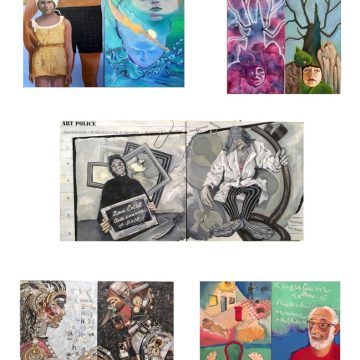Starring Role
colour pencil on paper relief
C. Ascher
For a number of years, I agreed as a special favour to an artist friend and fellow teacher to be a guest speaker in her class. Besides teaching at the art centre where I am also a curator and an administrator, she teaches at a local university in the art education department. The class in question is meant to prepare potential art teachers to enter the secondary or alternative adult art educational system. My contribution to the class was to address the students as a professional working in not-for-profit art centres. Despite being squeezed into a regular class, I usually spoke for far longer than my allotted time and answered many questions thereafter.
For my first couple of visits, I was paid $50.00 by the university. This is a ridiculous amount for a university to offer a guest speaker, but I was told my friend had obtained it to cover my gasoline and parking costs since her class didn’t qualify as a ‘lecture series’. Since she felt the exposure to professionals was an essential part of her students’ education, for my last appearance when the university didn’t even pay that amount, my friend bought me lunch.
Despite agreeing to speak to the class, I could not understand a university that puts teachers in a position where they must rely on volunteers to expose their students to professionals in their field, especially in education. Far from educating them to that profession, the message is disrespectful of both the profession and its practitioners. The teacher gets paid to teach but not the expert contributing to that teaching. The university is paid to provide a learning environment for all students equally, but not all guests are paid to help provide that learning.
I certainly understand that budgets are tight and volunteers and donors can add a dimension to the learning experience. Yet I have never known a guest from a university to volunteer to speak. At any rate, I would never expect it. As an educator, and despite working in a not-for-profit sector, I pay my guest professionals, They have invested time and money to achieve the level that makes them valuable as speakers, and it is my responsibility as a host to make sure that achievement is respected. In that regard, part of my responsibility as an educator is to make sure the students or audience to whom my guests present are aware of the value they are receiving. Also, if I am paid for my work, if the institution I work for charges for its work, then there is no excuse for us not to pay our guests for their work.
This year, the class has been taken over by another person who has requested that I return as a guest speaker, again for one hour of a regular class, with no mention of any kind of renumeration. I guess the assumption is that since I agreed before, I’ll agree again. Now, I also cannot understand a university-level educator who invites a speaker to her class without first taking the trouble to speak with the guest, explain the working conditions and ascertain that the guest will indeed be willing to donate his/her time. The students’ edification may not be motivation enough.
Why did I accept the invitation before as a volunteer but will not now? Whereas I at least knew the original teacher’s skills and teaching philosophy, I don’t know the new teacher, have no idea what she covers in the class, or her attitude to art education or to art itself. These details are important for my agreeing to address the class as well as to my preparation for the presentation and the method of its delivery, especially since the very means by which I was invited goes against all I believe about education, art and the respect of artists.
At the very least, as a professional in a complex field of practice – does the university understand that teaching art is a complex field of practice? – I would expect that the class spend time preparing to receive me by doing research and agreeing on a series of key questions relevant to their learning. This was not proposed. Lastly, I was asked to cover a demanding, multi-faceted subject, with visual aids yet, in a mere hour squeezed into a business-as-usual class context. All this demonstrates an alarmingly casual, even dismissive attitude to me and to ‘our’ profession.
I have not accepted to speak in this new teacher’s class without renumeration. Instead, I have offered her and her students a free tour of the art centre where I work, a two-hour session during which I will answer the student’s prepared questions about adult art education in a so-called alternative context. It’s a test. Do they value what they ask of me enough to at least make the effort to adjust their schedule and gather where my talk will make most sense? We will see.







